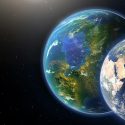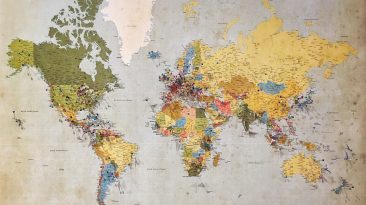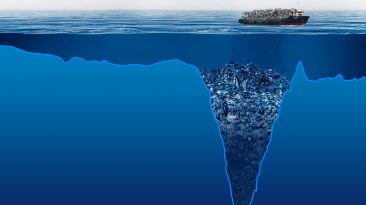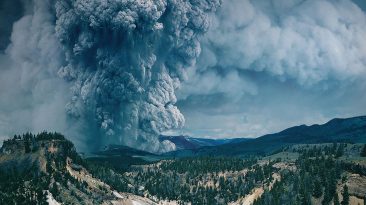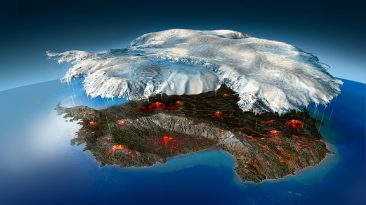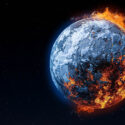There are some things you just can’t live without. Like gravity, oxygen, the Sun’s warmth. And we’re about to take those vital things away from you. But just for five seconds, don’t worry. Just how horrifying would those five seconds be? Which missing thing would be the worst to deal with? And could your life ever be the same when those life-supporting things come back?
NO SUN
OK, we will start big and remove the enormous, scorching ball of gas that makes our planet habitable. The Sun. You might think it would suddenly become very cold. But it wouldn’t. You wouldn’t even notice the difference. Our planet has stored enough heat in its atmosphere and oceans to keep us warm for those five seconds without the Sun.
But if our star suddenly vanished from the sky, things would get much worse than a little temperature drop. The Sun is the most massive object in the Solar System. It not only keeps us warm here on Earth, but it has a massive gravitational influence in space. Without the Sun, every planet, moon and asteroid in our galactic neighborhood would start flying off into outer space.
Now, this part gets a little confusing, but stay with me here. The moment the Sun disappears, the entire Solar System would plunge into chaos. Now, even though the Sun has vanished, you are still able to see it in the sky, as if nothing happened. This is because it takes the Sun’s light eight minutes to reach us on Earth. So you’d get this delayed effect of seeing the sunlight when the Sun is already gone.
Five seconds later, the Sun would return to its original position and Its gravity would grab ahold of all the planets again. They would stop heading off into space and return to orbiting the Sun as usual. Then, 8 minutes and 15 seconds later, you’d see the Sun blink for five seconds.
But you’d be most likely be busy trying to survive all the gravitational havoc losing the Sun might have caused in those five short seconds. The Earth wouldn’t travel far enough to leave the Habitable Zone. But we don’t know how this massive change in gravity would affect our Solar System.
NO OXYGEN
Alright, let’s try this again, maybe with something less dramatic. How about removing all the oxygen for five seconds? I mean, you could just hold your breath, right? Well, this might surprise you, but five seconds without oxygen would be fatal for you and the Earth. At first, you’d feel your ears burst. That’s because the air pressure would suddenly drop by 21%. Oh, that would be painful.
As soon as you recover from your pain, you’d see that all the concrete buildings had turned into dust. That’s because concrete sticks together thanks to carbon dioxide. This molecule consists of one carbon and two oxygen atoms. Without oxygen, nothing would hold the concrete in those structures together.
The planes would fall from the sky because there would be no combustion in their engines. And all the water on the planet would vanish too, and hydrogen would flood our atmosphere. But worst of all, without oxygen, your body would be filled with hydrogen gas and rupture. Even if the planet could eventually recover from these five seconds of horror, you wouldn’t have a chance of surviving it.
NO CARBON
OK. Not having oxygen would be bad. But what about carbon? You already know that all the concrete buildings would collapse. But could you survive without it? The short answer is no. The long answer is that you’d immediately lose 10-14 kg (22-31 lb) of your body mass. That’s because 18% of you is carbon. But it’s not the kind of weight you’d want to lose.
Carbon forms proteins, carbs and fats, and it’s a building material for your DNA. Without carbon, your primary body functions would just stop for five seconds. But you wouldn’t have to worry about long-term effects. That’s because the Earth, which has a very carbon-based core and mantle, would collapse in on itself. And no, you wouldn’t survive this scenario either.
NO GRAVITY
How about we try something more fun? Like gravity. Who needs it anyway? Imagine people, cars and everything not attached to the ground flying around. Well, the only downside is that you’d be flying in strong winds. I’m talking winds so strong that they would be six times more destructive than Hurricane Katrina.
And after five seconds of that, you’d plunge to the ground. At the same time, the Sun would lose its gravitational grip on us in space. The Earth would once again go flying in a straight line at 30 km/s (19 mi/s) until the Sun catches it again.
EARTH’S SPIN STOPS
That wasn’t so bad, was it? Those winds could really get much worse. Like if we made the Earth stop rotating for five seconds. If Earth came to a standstill, our atmosphere would keep moving, thanks to inertia. And this would make winds strong enough to rip Earth’s crust apart. The winds would be most powerful at the equator because of the Earth’s bulging shape, making the water flow away from the equator toward the poles. And that would cause massive tsunamis.
But things would start going back to normal after those horrifying five seconds. The winds would die down. The water would return to where it was, flooding everything in its way once again. After so much destruction, there might not be much left on Earth. You’d be lucky to survive this. And if you did, you’d have to spend the rest of your life rebuilding the planet.
It could be that after all of these disastrous scenarios, the Earth wouldn’t be suitable for life anymore. Then we’d need to start planning humanity’s global evacuation.
Sources
- “Oxygen | Center For Science Education”. 2021. scied.ucar.edu.
- “Here’s The Longest People Have Survived Without Air, Food, Water, Sunshine, Or Sleep”. 2021. businessinsider.com.
- “Ozone Layer ‘Rescued’ From CFC Damage”. Victoria Gill. 2021. bbc.com.
- “What Percentage Of The Human Body Is Water?”. 2021. medicalnewstoday.com.
- “Safe Use Of Hydrogen”. 2021. energy.gov.



